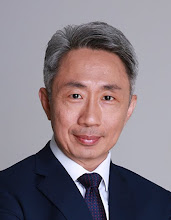Chinese New Year is not a time for drunken revelry and sequined hats like the new year celebration on the Gregorian calendar. Chinese New Year's Eve is when we gather in our houses for "reunion dinners" with family members. This year, I dined with my parents - both in their late seventies and spoke about my uncles and aunt - who'd all aged into infirmity and with declining health.
As they age into frailty, along with changes in the balance of power, come changes in the nature of love. I find myself feeling protective of my parents in new and disquieting ways. Just as I was once under the cover of their umbrella, they now seek shelter under mine. I give up a love that depends upon my parents and assume a new kind of love that is responsible for their welfare.
All of a sudden, I began to think about life - and death, love, God, suffering, forgiveness. Our lives change when we stop merely replying to questions and begin to ask them. I started asking questions. As I delved into my twenties and thirties, I could see that gradually I had allowed the hustle and bustle of the world to distract me, to affect me, to disorient me.
The world is full of men and women who work too much, sleep too little, hardly ever exercise, eat poorly and are always struggling to find adequate time to spend with their loved ones. We are in a perpetual hurry - constantly rushing from one activity to another. Realistically, there is never going to be a time when nothing is on our plate. At work, as leaders, we constantly see new things to fix or act upon. We are too busy for our own good. We need to slow down.
Is all this activity that clutters our lives helping us or is it hurting us?
We have more money and more choices, but less time. Less time to do the things that nurture well-being and less time to spend with the people who invigorate us. Life is not a competition to see who can collect the most expensive toys. The best things in life are not things - and sometimes less is more.
My experience as a leader has shown me that doing less but doing more of the right things are more effective. Do what counts.
As they age into frailty, along with changes in the balance of power, come changes in the nature of love. I find myself feeling protective of my parents in new and disquieting ways. Just as I was once under the cover of their umbrella, they now seek shelter under mine. I give up a love that depends upon my parents and assume a new kind of love that is responsible for their welfare.
All of a sudden, I began to think about life - and death, love, God, suffering, forgiveness. Our lives change when we stop merely replying to questions and begin to ask them. I started asking questions. As I delved into my twenties and thirties, I could see that gradually I had allowed the hustle and bustle of the world to distract me, to affect me, to disorient me.
The world is full of men and women who work too much, sleep too little, hardly ever exercise, eat poorly and are always struggling to find adequate time to spend with their loved ones. We are in a perpetual hurry - constantly rushing from one activity to another. Realistically, there is never going to be a time when nothing is on our plate. At work, as leaders, we constantly see new things to fix or act upon. We are too busy for our own good. We need to slow down.
Is all this activity that clutters our lives helping us or is it hurting us?
We have more money and more choices, but less time. Less time to do the things that nurture well-being and less time to spend with the people who invigorate us. Life is not a competition to see who can collect the most expensive toys. The best things in life are not things - and sometimes less is more.
My experience as a leader has shown me that doing less but doing more of the right things are more effective. Do what counts.









